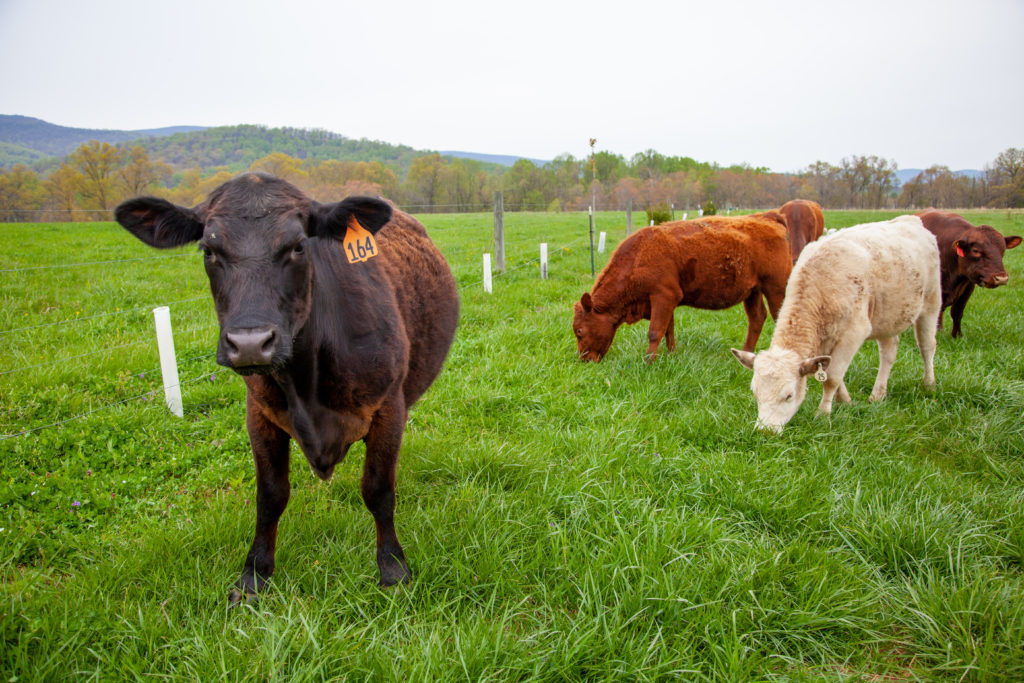At Bean Hollow Grassfed, Mike Sands wanted to use his training to revive Over Jordan Farm’s worn-out pastures and develop a financially stable farm model. Read about our approach to this project, or listen to Mike Sands directly.

A Case Study
In 2012, Dr. Michael Sands entered into a long-term lease arrangement with his retired in-laws to farm their 200-acre property, Over Jordan Farm, in Rappahannock County, Virginia. On 110 acres of pasture land, Sands created the sheep and cattle enterprise, Bean Hollow Grassfed.
With over 30 years of experience in sustainable agriculture, environmental conservation, and community-based economic development, Sands has worked on a broad range of innovative projects around the world. At Bean Hollow Grassfed, Sands wanted to use his training to revive Over Jordan Farm’s worn-out pastures and develop a financially stable farm model.
Sands partnered with The Piedmont Environmental Council (PEC) and Virginia Cooperative Extension to secure a Conservation Innovation Grant (CIG) through the Natural Resource Conservation Service. This grant enabled Sands to develop a project that could take measurements and demonstrate the positive impacts of some of the improved practices he employed on his farm.
Identifying the Problem
Bean Hollow Grassfed is located in Virginia’s northern Piedmont region, which has long been a pasture-based farming area dominated by beef cattle production. Many farms, including Over Jordan Farm where Bean Hollow Grassfed is located, have been continuously grazed to short stubble heights of less than four inches.
Overgrazing negatively affects pasture health and productivity through soil exposure and compaction, minimal warm season pasture plant diversity, and weed pressure.
- Soil exposure and compaction causes soil heating, which disrupts the soil biological community and destroys soil organic matter. It also contributes to water runoff and soil erosion.
- Piedmont pastures are dominated by Fescue KY31 which reduces growth of warm season plants, thus animal performance during summer months is limited.
- Weeds encroach in open spaces in the canopy, which initiates spraying and further disrupts the health and productivity of the pasture-soil system.
These pressures reduce pasture yields, carrying capacity, and livestock performance. These factors undermine farm profitability.
In our Piedmont region, revitalization of pastures with a history of resource depletion due to overgrazing is a high priority.
Finding the Solution
Soil health requires a diverse community of macro- and micro-organisms. A diverse plant community provides substrate for those soil organisms. Plant diversity improves water and nutrient capture and retention and different rooting depths and seasonality of plant growth better maintain the pasture canopy and forage supply throughout seasons.
A way to develop forage supply is to employ a form of grazing that uses rotations through pastures. Rotational mob grazing—a cycle of short grazing period followed by a long rest period—is thought to foster more native plant diversity, increase productivity, organic matter, build soil health and the related soil food webs, and increase drought resilience.
Imagine waiting in line at a salad bar. When it’s your turn you grab what you can—possibly something you haven’t tried before but find that you like. Limited time to eat and increased competition requires that you diversify your choices. In the pasture, this diversified grazing allows for older plants to produce lignified stems. Grazing at high stock densities tramples these stems into the soil surface along with manure, providing the substrates with the bacterial and fungal populations to build a food web and organic matter matrix. Grazing a diverse livestock herd can extend the soil building because of the difference in nutrient and bacterial composition of the manure of different livestock species.
As the plant community diversifies and the soil health strengthens, an assumption can be made that the productivity of grazing animals will increase, resulting in a profitable farm enterprise.
Bean Hollow Grassfed Project
When Michael Sands started Bean Hollow Grassfed, he was intent on employing soil building and rotational grazing methods. His farm was a good laboratory for showing the benefits of innovative pasture management practices, as it had been continuously grazed without any rotation for the past 20 years. This led to reduced soil health and pasture productivity.
Through the Natural Resource Conservation Service’s CIG grant, Sands was able to secure the funding to complete farm infrastructure improvements and begin a project that tracked the productivity of the farm.
The project team at The Piedmont Environmental Council oversaw and performed monitoring, promoted six field days and developed outreach materials on the project.
Hear Directly From Mike Sands
An important component of the project was to demonstrate to both rural landowners and producers the process of implementing a rotational grazing system using long rest periods with multiple livestock species and the effects of a system.
Outreach to producers and landowners included: Six field day events were held at the project site, each covering a different aspect of the project from setting up a rotational grazing system to managing land for pollinators. Project cooperator, PEC staff and interested local farmers took educational tours of similar farm demonstrations in Tennessee and the Virginia Shenandoah Valley. Articles about the demonstration project were placed in 4 publications, including: Piedmont View Winter 2014, Piedmont View Summer 2016, the 2016 Buy Fresh Buy Local guide with distribution of over 250,000, and the Rappahannock News Summer 2016.
Presentations about the project were given at the VABF conference 2015, Farm Business Development Center (Illinois) 2015, Virginia NRSC CIG Showcase 2016 and the 2016 National Small Farm Conference.
This video was also produced as part of the grant deliverables and helps outline the project and the benefits of rotational grazing and warm-season grasses.
In 2017, we uploaded select clips from the video on to SoundCloud!




Mike Sands partnered with The Piedmont Environmental Council (PEC) and Virginia Cooperative Extension to secure a Conservation Innovation Grant (CIG) through the Natural Resource Conservation Service. This grant enabled Sands to develop a project that could take measurements and demonstrate the positive impacts of some of the improved practices he employed on his farm. Other key partners included the Virginia Cooperative Extension, Culpeper Soil & Water Conservation District, the USDA NRCS Culpeper Office and Virginia Working Landscapes.
